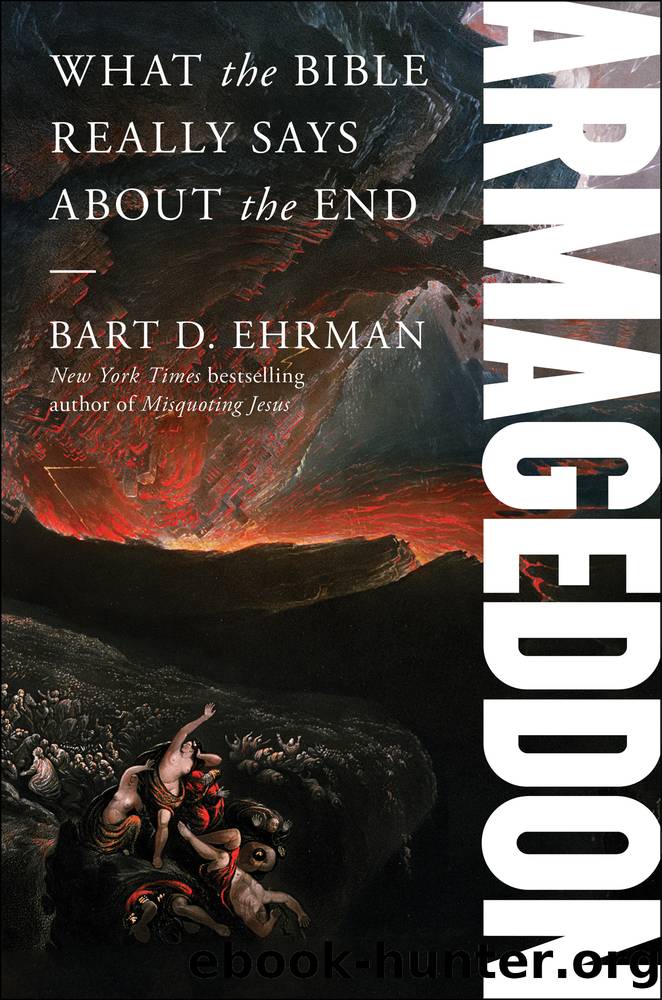Armageddon: What the Bible Really Says about the End by Bart D. Ehrman

Author:Bart D. Ehrman
Language: eng
Format: epub
Publisher: Simon & Schuster
Published: 2023-03-21T00:00:00+00:00
THE FATAL FLAW OF FUTURISTIC FANTASIES: LOCUSTS FROM THE PIT (REVELATION 9)
It can be amusing for nonfundamentalist readers who first encounter modern prophecy books to notice how many of them begin by indicating that all of their fundamentalist predecessors had been wrong: they were too precise in picking a date, or they misinterpreted this or that passage, or they were advancing their own agendas instead of listening to what the Bible actually predicts. But now, they say, in this book we will see what the signs are definitely pointing to. Often the author will insist these are not his own hypotheses but are the teachings of the Bible itself. The implication is clear: if you disagree with the authorâs claims, you are disagreeing with God.12
The invariable thesis of all of these booksâthat the Bible was not written for its own time but for oursâencounters a rather obvious problem: it would mean that the biblical authors who address specific readers did not expect them to have any clue what they were talking about. Thatâs not how authors, ancient or modern, work. Authors write for readers in their own time and place. When John addressed the first-century Christians in the church of Philadelphia in Asia Minor, he was giving them a message. He did not secretly intend the message for twenty-first-century Christians in the church of Philadelphia, Pennsylvania.
Among modern prophecy âexpertsâ who argue to the contrary that Revelation was meant for readers living 1,900 years after its authorâs death, none has been more outspoken than the aforementioned Hal Lindsey, author of The Late Great Planet Earth. In 1970, Lindsey argued that Revelation described what would happen before the end of the 1980s. When his predictions didnât come true, or even close to true, he continued writing books and giving lectures about how now the signs were coming to be fulfilled. Heâs still talking about it on TV. But that must mean that the biblical authors were not, in fact, writing for Christians in the 1970s and â80s, as he originally claimed, but for those in the 1990s, then for those in the 2000s, then in the 2010s, and now in the 2020s. The goalposts continually move. If they didnât, thereâd be no reason to keep writing more and more books showing that the prophecies are finally now being fulfilled.
In his original book, when Lindsey argues that Revelation was not written to be understood by its first-century readers, he does so with an intriguing sleight of hand. He does indeed stress that we need to put the author in his own time and understand what he understood. But that does not mean that Lindsey wants to understand the book in its own context. Just the contrary. In Lindseyâs view, as a first-century Christian, John of Patmos was shown visions of events to transpire 1,900 years later, and he simply could not understand what he was seeing. How could he? How could someone two thousand years ago describe the explosion of a nuclear bomb?
Download
This site does not store any files on its server. We only index and link to content provided by other sites. Please contact the content providers to delete copyright contents if any and email us, we'll remove relevant links or contents immediately.
| Guides | New Testament |
| Old Testament |
The Five People You Meet in Heaven by Mitch Albom(2842)
Name Book, The: Over 10,000 Names--Their Meanings, Origins, and Spiritual Significance by Astoria Dorothy(2490)
Real Sex by Lauren F. Winner(2475)
The Holy Spirit by Billy Graham(2418)
The Secret Power of Speaking God's Word by Joyce Meyer(2253)
0041152001443424520 .pdf by Unknown(2220)
How The Mind Works by Steven Pinker(2213)
Ancient Worlds by Michael Scott(2103)
ESV Study Bible by Crossway(2097)
The Meaning of the Library by unknow(2069)
The Gnostic Gospels by Pagels Elaine(2026)
Churchill by Paul Johnson(2012)
MOSES THE EGYPTIAN by Jan Assmann(1972)
The ESV Study Bible by Crossway Bibles(1915)
Jesus by Paul Johnson(1887)
The Nativity by Geza Vermes(1849)
Ancient Near Eastern Thought and the Old Testament by John H. Walton(1846)
The Complete Dead Sea Scrolls in English (7th Edition) (Penguin Classics) by Geza Vermes(1840)
City of Stairs by Robert Jackson Bennett(1826)
